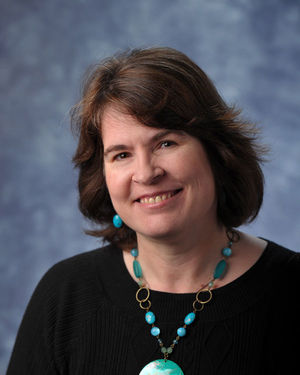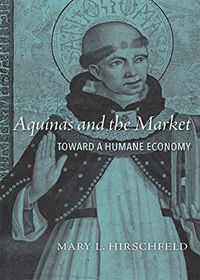
- Villanova University
- Assistant Professor
- Affiliation During NDIAS Fellowship: University of Notre Dame
- Graduate Fellow (2010-2011)
- “Virtuous Consumption in a Dynamic Economy: A Thomistic Engagement with Neoclassical Economics”
Mary Hirschfeld earned her Ph.D. in economics from Harvard University in 1989, specializing in the fields of macroeconomics and economic history. She was a professor of economics at Occidental College from 1988 to 2003 and she also served as Chair of the Department of Economics and as a member of several committees, including the institution’s Educational Policy Committee. Following a conversion to Catholicism, she left her position to study moral theology at Notre Dame, earning her Master of Theological Science degree in 2005. She is currently a Ph.D. candidate in the field of moral theology at Notre Dame. Her dissertation focuses on a Thomistic framework for thinking about economics, with an emphasis on consumption.
In the field of economics, Professor Hirschfeld has explored research interests in feminist economics and heterodox approaches to economic theory. She has taught a variety of courses on topics that include the development of capitalism, macroeconomics, financial markets, economics and philosophy, European history, and persecution in America. She is the author of several articles on economics in the Review of Economics and Statistics, the Journal of Economic Education, and History of Political Economy, as well as a recent article on moral theology in the Journal of the Society of Christian Ethics. In 2010, Professor Hirschfeld was awarded a Charlotte W. Newcombe Doctoral Dissertation Fellowship.
Publications
-
Aquinas and the Market: Toward a Humane Economy
Harvard University Press, 2018

Economists and theologians usually inhabit different intellectual worlds. Economists investigate the workings of markets and tend to set ethical questions aside. Theologians, anxious to take up concerns raised by market outcomes, often dismiss economics and lose insights into the influence of market incentives on individual behavior. Mary L. Hirschfeld, who was a professor of economics for fifteen years before training as a theologian, seeks to bridge these two fields in this innovative work about economics and the thought of St. Thomas Aquinas.
According to Hirschfeld, an economics rooted in Thomistic thought integrates many of the insights of economists with a larger view of the good life, and gives us critical purchase on the ethical shortcomings of modern capitalism. In a Thomistic approach, she writes, ethics and economics cannot be reconciled if we begin with narrow questions about fair wages or the acceptability of usury. Rather, we must begin with an understanding of how economic life serves human happiness. The key point is that material wealth is an instrumental good, valuable only to the extent that it allows people to flourish. Hirschfeld uses that insight to develop an account of a genuinely humane economy in which pragmatic and material concerns matter but the pursuit of wealth for its own sake is not the ultimate goal.
The Thomistic economics that Hirschfeld outlines is thus capable of dealing with our culture as it is, while still offering direction about how we might make the economy better serve the human good.